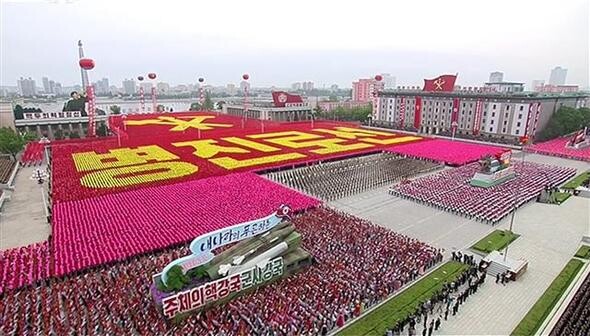hankyoreh
Links to other country sites 다른 나라 사이트 링크
[Editorial] With Kim Jong-un promoted, North Korea is both stable and vulnerable

Wrapping up on May 9, the 7th Congress of the Korean Workers’ Party (KWP) was the event at which North Korea put the finishing touches on the Kim Jong-un regime, which had been several years in the making. Kim’s promotion to the new supreme rank of KWP chairman on the final day of the party congress shows that he seeks the same long-term rule as his grandfather Kim Il-sung and his father Kim Jong-il. But considering that the Kim regime has changed little of its strategy or vision, chances are low that it will manage to escape from its isolation abroad and its economic troubles at home.
Kim Jong-un has built a party-centered regime that is different from the Songun, or “military first,” approach of Kim Jong-il. Kim Jong-un avoided radical changes even in the key party positions and sought to maintain harmony between the old guard and the young blood.
A new framework has been created for the Kim Jong-un dictatorship, which appears relatively stable (thanks to the bloody purges carried out after Kim took power). At least for the time being, there do not appear to be any factions in North Korea that can challenge this system. South Korea and the rest of North Korea’s neighbors need to realistically acknowledge Kim’s position and frame their North Korean policies accordingly.
The fact that Kim did no more than reiterate his two-track strategy of building the economy and nuclear weapons shows the limitations of his new regime. Since Kim failed to offer any practical plans in the area of the economy, it would be no exaggeration to say that nuclear weapons are the only thing propping up the internal legitimacy of the Kim Jong-un regime. Indeed, Kim declared North Korea to be “a permanent nuclear weapon state,” and a phrase to this effect was added to the party‘s bylaws.
But as long as no countries are willing to accept North Korea as a nuclear weapon state, this strategy will only exacerbate conflict with the international community. This drags on the stalemate, since all issues are tied up with the nuclear issue.
Despite this, efforts to find a solution to the nuclear issue must continue. This will require an attitude adjustment on both sides. First of all, North Korea must get over its obsession with nuclear weapons. It must realize that the regime’s legitimacy is found not in nuclear weapons but in improving the people’s quality of life and that the two-track approach to nuclear weapons and the economy is not feasible.
In order for North Korea to come to these conclusions, it is important for its neighbors to provide incentives and to take part in dialogue with North Korea. These countries need to seize upon the smallest likelihood that North Korea will move down the path toward giving up nuclear weapons. One example of this is the idea of parallel denuclearization and peace talks that China has been promoting since the beginning of this year.
The Kim Jong-un regime is at once characterized by stability and vulnerability. The regime is not so stable that it can easily deal with any serious challenges in the areas of the economy or foreign policy. But by the same token, it is not so vulnerable that it will simply collapse under external pressure. Since the key is ultimately to be found in the nuclear issue, North Korea and its neighbors must all focus on resolving that.
Please direct questions or comments to [english@hani.co.kr]

Editorial・opinion
![[Column] Has Korea, too, crossed the Rubicon on China? [Column] Has Korea, too, crossed the Rubicon on China?](https://flexible.img.hani.co.kr/flexible/normal/500/300/imgdb/original/2024/0419/9317135153409185.jpg) [Column] Has Korea, too, crossed the Rubicon on China?
[Column] Has Korea, too, crossed the Rubicon on China?![[Correspondent’s column] In Japan’s alliance with US, echoes of its past alliances with UK [Correspondent’s column] In Japan’s alliance with US, echoes of its past alliances with UK](https://flexible.img.hani.co.kr/flexible/normal/500/300/imgdb/original/2024/0419/2317135166563519.jpg) [Correspondent’s column] In Japan’s alliance with US, echoes of its past alliances with UK
[Correspondent’s column] In Japan’s alliance with US, echoes of its past alliances with UK- [Editorial] Does Yoon think the Korean public is wrong?
- [Editorial] As it bolsters its alliance with US, Japan must be accountable for past
- [Guest essay] Amending the Constitution is Yoon’s key to leaving office in public’s good graces
- [Editorial] 10 years on, lessons of Sewol tragedy must never be forgotten
- [Column] A death blow to Korea’s prosecutor politics
- [Correspondent’s column] The US and the end of Japanese pacifism
- [Guest essay] How Korea turned its trainee doctors into monsters
- [Guest essay] As someone who helped forge Seoul-Moscow ties, their status today troubles me
Most viewed articles
- 1[Column] The clock is ticking for Korea’s first lady
- 2Hong Se-hwa, voice for tolerance whose memoir of exile touched a chord, dies at 76
- 3After 2 months of delayed, denied medical care, Koreans worry worst may be yet to come
- 4[Column] Has Korea, too, crossed the Rubicon on China?
- 5Samsung barricades office as unionized workers strike for better conditions
- 6US overtakes China as Korea’s top export market, prompting trade sanction jitters
- 7All eyes on Xiaomi after it pulls off EV that Apple couldn’t
- 8[Guest essay] How Korea turned its trainee doctors into monsters
- 9[Editorial] As it bolsters its alliance with US, Japan must be accountable for past
- 10[Correspondent’s column] In Japan’s alliance with US, echoes of its past alliances with UK